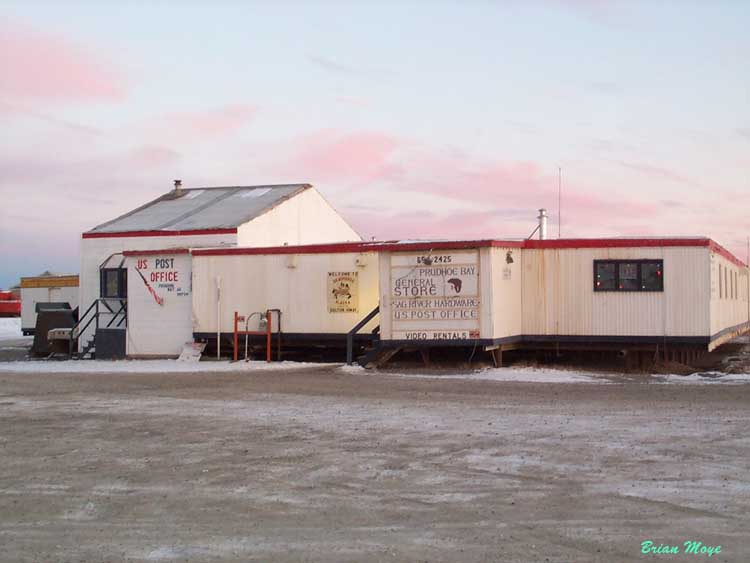Fun, in Prudhoe Bay, Alaska, is a calendar event. Out here, on the largest and most remote oil field in the United States, thousands of workers rise each morning in endless summer, eternal darkness, mosquitos, and snow, to begin twelve-hour shifts, which on the drilling rigs requires a discipline that is taken seriously: a mistake, however small, could cause this entire place to explode, as it did in West Texas two years ago, or in Texas City twelve years ago. For a change of landscape one can board a bus with elderly tourists to the edge of the Arctic Ocean, point out the artificial palm tree, suggest a dip, and laugh—the water is 28 degrees—but even that route grows dull: the single gravel lane that traces tundra abuts miles of pipeline. For the oil workers, there is little to look forward to before the end of a two-week shift except for scheduled socialization. Each summer, such fun goes by the name Deadhorse Dash, a 5K race traced across nearby Holly Lake.
“Last year, someone dressed up as a dancing polar bear,” Casey Pfeifer, a cafeteria attendant, tells me when I arrive at the Prudhoe Bay Hotel for lunch on the afternoon of the race. Casey is wearing purple eyeliner and a sweatshirt that reads MICHIGAN in looping gold-glitter cursive. Every two months Casey travels between Idaho and Prudhoe Bay—for her, life in Alaska is synonymous with adventure—to work in the service industry at places like the Hotel, which is not actually a hotel at all but a work-camp lodge, with hundreds of tiny rooms housing twin-size cots and lockers. Casey smiles at me from behind her warming tray and I feel cozy, despite the dirt and dust clinging to my skin. The fluorescent lights illuminate her golden hair, which is tucked into a sock bun, and she tongs a sliver of battered cod. “Picture it,” Casey says. She sways her butt to the sound of nothing. “This giant bear, and he is grooving.”
I picture an enormous mascot gyrating to the Backstreet Boys. It is not my idea of fun, but I am an outsider. I had arrived on the North Slope only the day before, seeking a week in the most isolated community in America and what I hoped would be storybook Alaska: purple arching Coho salmon, caribou, moose, air that belongs in a breath-mint commercial. Instead I found square buildings like so many others, and a cafeteria just like that of a high school, with wheels of cheesecake and racks of chips. How normal everything felt. At an empty table, I watch workers lay playing cards out in front of them. Behind them, mounted televisions loop the Steve Harvey Show and Maury, The Price Is Right and Dr. Phil. Workers in heavy coveralls spoon cubes of honeydew onto their plates, consider the merits of the cacciatore, and pile their bowls with limp linguini. They puff their cheeks like chipmunks, gearing up, they joke, for what would no doubt prove a feat of monumental athleticism.
“The calories aren’t expended in the walking,” one worker tells me, reaching into a basket of Little Debbie Swiss Cake Rolls. I watch as his hands, the largest I have ever seen, raise the cakes to his mouth. He consumes them whole, parting his lips dramatically—wet pink petals, upon which the skin blisters, burned by Arctic sunlight. His name, he says, is Jeff Snow, but he goes by Snowman. He earned the nickname in the dead of winter, because up here, he comes alive: a redneck, forklift-driving Frosty the Snowman, made animate by extremes.
(…)


